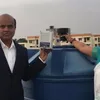How Delhi’s Craft Village is ensuring COVID warriors have ‘concrete’ PPE amidst the pandemic
Looking at the impact of the coronavirus pandemic, Delhi-based Craft Village along with Dalmia Cement’s Craft Beton has been making ‘concrete’ PPE suits for police personnel and healthcare providers.
The COVID-19 pandemic rubbed salt in the wounds of an already suffering community of Indian artisans, with many small artists losing their source of livelihood amid the lockdown.
According to India Brand Equity Foundation (IBEF), the Indian handicrafts industry is fragmented with over seven million regional artisans and over 67,000 exporters/export houses, promoting regional art and craftsmanship in the domestic and global markets.

Iti Tyagi, Founder Crafts Village
To help such artisans, the founders of — Somesh Singh and his wife Iti Tyagi — decided to create ‘concrete’ PPE suits for COVID warriors, as well as help artisans, earn their income. Somesh was the former director of The Institute of Apparel Management, Gurugram, while Iti is a sustainable designer.
“Coming from a background of designing police/military uniforms at NID, I thought I must contribute in the moment of need. No matter what professionally I am doing differently at the moment, we have joined this war against COVID-19 in our capacity,” says Somesh.
Using cement fabric
Upon reading several media reports on how on-ground personnel, such as healthcare workers, doctors, and police were devoid of proper safety equipment, Somesh decided to make personal protective equipment (PPE) kits that would be of right safety standards, as well as sustainable.
He researched and found that the PPE kits need to be airtight or have highly-filtered protection from the infected air. Further, they also need to be de-infected while a person is wearing the attire, so the fabric has to be waterproof.
“There were many materials available, but most of them are 100 percent synthetic. The cement fabric is a combination of natural material (50 percent) and synthetic material (50 percent), making it more comfortable to wear, and later when it is disposed of, it reduces the impact on the environment. That is also a battle we have to constantly think of,” Somesh says.
Thus, the founders of Craft Village decided to build these ‘concrete’ suits called CoValor -21. These suits are available in the price range between Rs 3,500-Rs 5,000, depending on the quality of the fabric.

Somesh Singh
Craft Village has tied up with Craft Beton — a business venture by Dalmia Cement — which provides the ‘cement’ used in these suits.
“All our products address multiple needs, thereby reducing the number of products one needs to own to avoid anti-dumping and waste reduction,” says Somesh.
Currently, these concrete suits are in the lab testing stage, and have also been given to doctors and police personnel on-ground for testing its viability. The production of the suits is managed and handled by Dalmia Cement’s Craft Beton.
The background
Delhi-based Craft Village is an innovative centre and artist village that focusses on building an ecosystem through the India Craft Week (ICW) to increase demand for authentic handcrafted products, linking the artisans and buyers directly by eliminating the middle-men or agencies. Crafts Village was founded by Somesh and Iti in June 2015.
Since its inception, the organisation has been focussed on reviving the interest of crafts, especially among modern consumers and urban centres, bridging the gap between rural and urban communities, so that the migration of villagers can stop, and how these can help the artisan community find better employment opportunities in the long-term.
The organisation has built a better value proposition of hand-made, indigenous crafts through better communication and contemporary image, brand building, visual merchandising, and displaying them to customers.
It also focusses on portraying artisans as — “Makers” — just like how artists are represented in art fairs globally. The team is currently working on patents for their designs.
At present, many Indian artists are also proving to find a source of income through these concrete suits by designing them.
The market and future
As part of the ICW, so far, Craft Village has received participation from over 150 participants from over 60 nations, and has had over 10,000+ visitors annually. As per Somesh, in 2019, the creative industry was estimated to be a $5 trillion industry, that employs over 100 million people worldwide.
Starting with profits of Rs 6.5 lakh, the organisation now claims to have made profits of Rs 48.30 lakh in the last financial year.
Moving forward, Somesh says, “The next level for Craft Village is to scale the business through craft and design projects, and to achieve Rs 100 crore revenue in next three years by bringing more investments, and increasing the revenue earning to fuel the growth cycle.”
Edited by Suman Singh










